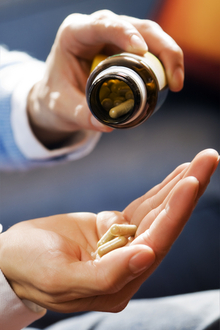With the many equine products available both on-line and in markets, knowing when a drug or medication has been approved by the FDA can be tricky. Many non-approved drugs and medication mimic the packaging and advertising of drugs that have gone through the approval process, making it difficult to tell the look-alikes from the real FDA approved product.

Better horse health through careful selection of medications
Read labels and inserts carefully to make sure the medication is the real deal - not a look-alike - and is approved by the FDA for use in horses.
Often priced below the going price for FDA approved medications, horse owners may believe that they are getting either the same or a comparable product, when, in fact, the product does not have the purity or potency of the approved drug.
The FDA has strict requirements not only for the ingredients in an approved drug, but also for the packaging and documentation on required inserts included with the medication.
Tips on what to look for in the packaging of an FDA approved product for horses:
- The required package insert will include cautions, dosage, descriptions and indications for use
- A comprehensive description of what is in the medication and the fact that these items are routinely monitored by the FDA
- Indications for use state clearly what the product can legally claim because of scientific proof
- The package will have a National Drug Code Number (NDCN) required for registered drugs
- The package will also have a NADA Number specific to animal drugs and the number will also be on the label on the bottle or container of the drug
- The label will include Stated FDA Approval and the fact that the product meets strict requirements for safety and efficacy.
According to April Knudson, DVM, an equine specialist with Merial Veterinary Services, who has a doctor of veterinary degree from the University of California-Davis and a special interest in equine gastrointestinal health, infectious disease and lameness, sorting through available drugs on the market can be a challenge.
Dr. Knudson poses the question: "Should you choose based on price, your trainer’s suggestion or maybe what worked for a friend’s horse?" in a press release and then goes on to answer it."
While these might be used as secondary considerations, none of them should drive your decision when selecting a drug to give to your horse. Instead, that decision should be made based upon your veterinarian’s recommendation and whether or not the product has been approved by the FDA.
Here’s why:
Drugs approved by the FDA provide horse owners with the peace of mind that they have been thoroughly tested for both safety and effectiveness.
So what does that mean to the health of your horse?
During a new drug’s development phase, the company bringing it to market conducts tests to demonstrate the safety of the proposed product in the target animal. Tests are also conducted to confirm the efficacy of a product.2 When the labeling and subsequent advertising are developed, the FDA regulates what claims can and can’t be included.3 The FDA’s stringent labeling guidelines help ensure product claims are fair and accurate and that horse owners will be aware of any possible risks associated with the product.3
After a drug is approved by the FDA and available on the market, the agency continues to monitor it, including any adverse events that may occur. This helps identify any problems that may arise and enables companies to address them quickly.
Unfortunately, some drugs are produced and marketed to horse owners that are not FDA-approved, and therefore have not undergone safety and efficacy testing. In many instances, these products make claims that have not been proven.4-6 Examples of products being falsely marketed are any that advertise themselves to be the equivalent of ULCERGARD® (omeprazole) or GASTROGARD® (omeprazole),4-6 which are the only FDA-approved products for the prevention7 and treatment8 of equine stomach ulcers.
Other products all horse owners should be wary of are those claiming to be the equivalent of ADEQUAN® (polysulfated glycosaminoglycan), BANAMINE® (flunixin), Phenylbutazone, PROTAZIL® (diclazuril), and REGU-MATE® (altrenogest). Non FDA-approved counterfeit versions of these drugs are also widely available. Taking chances with any product that has not been FDA-approved and therefore does not meet safety and efficacy standards, means your horse may continue to suffer and you may be wasting money."
